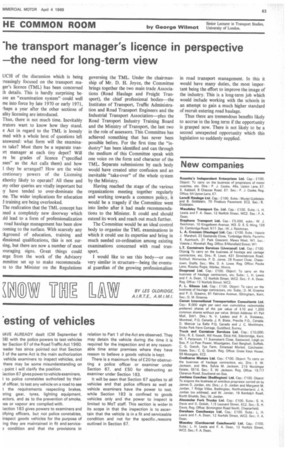he transport manager's licence in perspective the need for long-term view
Page 65

If you've noticed an error in this article please click here to report it so we can fix it.
UCH of the discussion which is being :reasingly focused on the transport mager's licence (TML) has been concerned th details. This is hardly surprising beuse an "examination system" could well me into force by late 1970 or early 1971, -haps a year after the other sections of ality licensing are introduced.
Thus, there is not much time. Inevitably !rators want to know how they stand. e Act in regard to the TML is loosely med with a whole host of questions left answered: what form will the examinans take? Must there be a separate tranwt manager at each tiny depot? Will re be grades of licence ("specified sses" as the Act calls them) and how 1 they be arranged? How are the wide cretionary powers of the Licensing ithority likely to operate? All these and my other queries are vitally important but y have tended to over-dominate the :ne. The wider implications for education i training are being overlooked.
The realization that the TML concept has ,tried a completely new doorway which ild lead to a form of professionalization road haulage management has been slow oming to the surface. With scarcely any ;kground of education, training and )fessional qualifications, this is not sursing, but there are now a number of most :ouraging signs. Great things could erge from the work of the Advisory mmittee set up to make recommendais to the Minister on the Regulations
governing the TML. Under the chairmanship of Mr. D. H. Joyce, the Committee brings together the two main trade Associations (Road Haulage and Freight Transport), the chief professional bodiesthe Institutes of Transport, Traffic Administration and Road Transport Engineers and the Industrial Transport Association-plus the Road Transport Industry Training Board and the Ministry of Transport, the last two in the role of assessors. This Committee has achieved something that has never been possible before. For the first time the "industry" has been identified and can through the medium of this Committee speak with one voice on the form and character of the TML. Separate submissions by each body would have created utter confusion and an inevitable "take-overof the whole system by the Ministry.
Having reached the stage of the various organizations meeting together regularly and working towards a common policy, it would be a tragedy if the Committee went into limbo after it had made recommendations to the Minister. It could and should extend its work and reach out much further.
The Committee would be an ideal control body to organize the TML examinations in which it could use its expertise and bring in much needed co-ordination among existing examinations concerned with road transport.
I would like to see this body-or one very similar in structure-being the eventual guardian of the growing professionalism in road transport management. In this it would have many duties, the most important being the effort to improve the image of the industry. This is a long-term job which would include working with the schools in an attempt to gain a much higher standard of recruit entering road haulage.
Thus there are tremendous benefits likely to accrue in the long term if the opportunity is grasped now. There is not likely to be a second unexpected opportunity which this legislation so suddenly supplied.










































































































